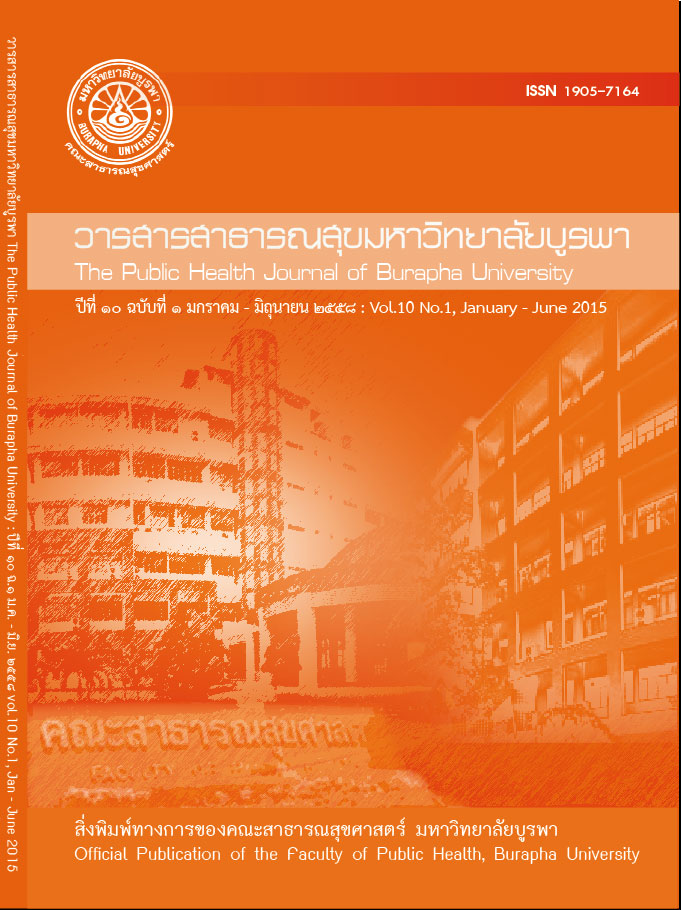Effects of Self-Regulation with Applied Buddhist Medicine on Self-Care Behaviors and Blood Pressure for People with Pre-Hypertension
Main Article Content
บทคัดย่อ
ผลของโปรแกรมการกำกับตนเองที่ประยุกต์การแพทย์วิถีพุทธ ต่อพฤติกรรมดูแลตนเองและระดับความดันโลหิต ในผู้ที่เสี่ยงต่อโรคความดันโลหิตสูง
สิรญา ธาสถาน*, พรนภา หอมสินธุ์**, รุ่งรัตน์ ศรีสุริยเวศน์***, ใจเพชร กล้าจน****
*นิสิตระดับบัณฑิตศึกษา สาขาพยาบาลเวชปฏิบัติชุมชน คณะพยาบาลศาสตร์ มหาวิทยาลัยบูรพา
**ผู้นิพนธ์หลัก คณะพยาบาลศาสตร์ มหาวิทยาลัยบูรพา
***คณะพยาบาลศาสตร์ มหาวิทยาลัยบูรพา
****โรงพยาบาลอำนาจเจริญ
การวิจัยกึ่งทดลองแบบสองกลุ่มวัดก่อนและหลังการทดลองนี้ มีวัตถุประสงค์เพื่อศึกษาผล ของโปรแกรมการกำกับตนเองที่ประยุกต์การแพทย์วิถีพุทธต่อพฤติกรรมการดูแลตนเองและระดับ ความดันโลหิตในผู้ที่เสี่ยงต่อโรคความดันโลหิตสูงจังหวัดลพบุรีแบ่งเป็นกลุ่มทดลองและกลุ่มควบคุม กลุ่มละ 30 คน โดยกลุ่มทดลองได้รับโปรแกรมการกำกับ ตนเองที่ประยุกต์การแพทย์วิถีพุทธ นาน 6สัปดาห์ประกอบด้วยกระบวนการกำกับตนเอง3ขั้นตอน ได้แก่การสังเกตตนเอง การตัดสินใจ การแสดงปฏิกิริยาต่อตนเอง เพื่อการปรับเปลี่ยนพฤติกรรมตามแนวทางการแพทย์วิถีพุทธส่วนกลุ่ม ควบคุมได้รับความรู้ในการปฏิบัติตนตามเกณฑ์กระทรวงสาธารณสุข เก็บรวบรวมข้อมูลโดยใช้ แบบสอบถาม และเครื่องวัดความดันโลหิต วิเคราะห์ข้อมูลโดยใช้สถิติร้อยละ ค่าเฉลี่ยส่วนเบี่ยงเบน มาตรฐาน Chi-square test, Paired t-test, Fisher’s Exact และ Independent t-test ผลการศึกษา พบว่า กลุ่มทดลองมีคะแนนเฉลี่ยพฤติกรรมสูงขึ้นกว่าก่อนทดลองและระดับ ความดันโลหิตช่วงบนและช่วงล่างลดลงกว่าก่อนทดลอง และกลุ่มทดลองมีคะแนนเฉลี่ยพฤติกรรม สูงกว่ากลุ่มควบคุม ระดับความดันโลหิตช่วงบนและช่วงล่างลดลงกว่ากลุ่มควบคุมอย่างมีนัยสำคัญ ทางสถิติที่ระดับ .05 บุคลากรสาธารณสุข และผู้ที่เกี่ยวข้อง สามารถนำโปรแกรมนี้ไปประยุกต์ใช้ใน การดูแลประชาชนเพื่อป้องกันการเกิดโรคความดันโลหิตสูงในชุมชนต่อไป
The quasi-experimental study with a nonequivalent control-group pretest/posttest design was conducted to determine the effects of self-regulation program using applied Buddhist medicine on the self-care behaviors and on the blood pressure for people with prehypertension in the Loppuri province. The participants were divided into experimental and control groups of 30 people each. The experimental group participated in a six-week selfregulation program based on the Buddhist medicine approach. The program consisted of three stages: self-observation, a judgment process and the participants’ self-reaction to their changing health behaviors according to the Buddhist medicine guidelines. The control group received the conventional education program of the Ministry of Public Health. Data was collected by self-administered questionnaires and automatic blood pressure measurement devices. Statistical analysis was performed using percentages, means, standard deviations, the Chi-square test, the paired t-test, the Fisher’s Exact test, and an independent t- test.
Compared to the pretest, the posttest showed that the experimental group had a higher mean score level of self-care behaviors, and had lower systolic and diastolic blood pressure at a .05 significant level. Besides, the experimental group also had the higher mean score level of self-care behaviors, and lower systolic and diastolic blood pressure compared to the control group at a .05 significance level. Health professionals and other concerned parties can apply this program to take care of people with hypertension in order to prevent chronic diseases in the community.

